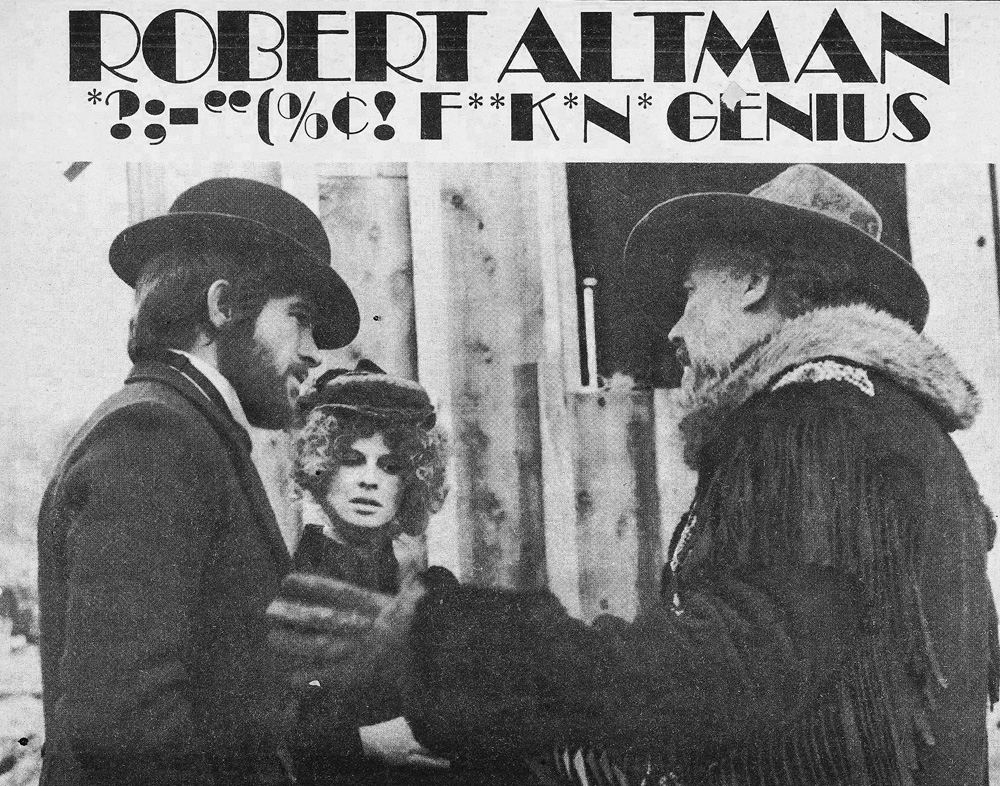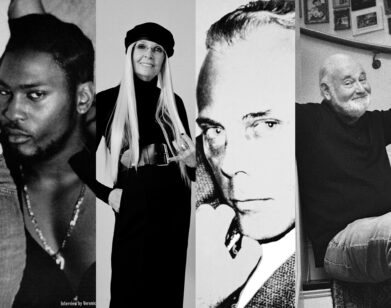Robert Altman: F**k*n* Genius

Robert Altman is one of the American movie’s leading practitioners of rugged individualism. His manner is acutely sensitive gruffness. He might use the word “shit” frequently when thinking of the sublime. He’s capable of elegance by accident and can see good in people we gave up on a long time ago. In M*A*S*H, he had a smash hit anti-war low comedy that was vulgar but for mostly the right reasons. In McCabe & Mrs. Miller he had perhaps the best American Star vehicle of the ’70s. An all around art movie in many respects McCabe & Mrs. Miller he gave Warren Beatty and Julie Christie lots of beautiful story and visual territory to operate in. So in many ways it was a great Hollywood tradition movie. It showed stars to their best advantage.
We talked to him between planes from Cannes to Hollywood about his new film Images and other things.
GLENN O’BRIEN: How did Images do in Cannes?
ROBERT ALTMAN: Great. Susanna [York] won the best actress award, which is kind of what we figured would happen. We got fantastic French reviews and all the English reviews were bad or qualified which is consistent. There’s no way I can connect with the English for some reason. Even if a picture is successful the critics just don’t like it, just don’t get it. The French grab everything more and more. So I’ve come to the conclusion that I like the French more than the English, because of their obvious intelligence. But we accomplished what we wanted to. We don’t really like it or really don’t like it. They say, “Well, I don’t understand this. It’s pretentious.”
O’BRIEN: It contains a lot of fantasy?
ALTMAN: Yeah, but you don’t necessarily know that, you don’t know which is which. It isn’t done in terms of fantasy. It’s really impossible to talk about it. I had a point of view when we made it; the point I was trying to make was that we were presenting this particular picture and the audience, depending on how involved they become, can turn it into what their own experiences are.
O’BRIEN: How did you get together with Susanna York?
ALTMAN: I wrote the script about six years ago and started to make it many times and the problem was that the girl is so necessary because she is on the screen 100% of the time, or her point of view is. We finally decided to go ahead with it and Julie Christie was going to do it. Then her schedule wouldn’t allow it, and I was flying to Europe to try to cast it and set it up and on the plane going over I saw a really bad picture called Jane Eyre that Susanna York was in. And Susanna York had been suggested to me by many people and I’d said no, no, no; I hadn’t seen very much of her. I didn’t see the Sister George picture and I didn’t see the dance marathon picture . . . Shoot Horses. And I saw this picture and I thought Scott’s performance was so bad, but I couldn’t take my eyes off her. I couldn’t wait for her to get back on the screen. She just seemed to have a quality of depth that I got very interested. And I took it from there because I knew that I had to have somebody that the audiences weren’t going to get tired of. Then I met her, I went to Corfu, she was vacationing with her husband. I talked to her and she was very frightened by the script. It was no good to read. You couldn’t make any sense out of it. But she really made it work. Rex Reed is right about that I think.
O’BRIEN: Did you see X, Y, and Zee?
ALTMAN: No.
O’BRIEN: She’s great in that.
ALTMAN: Well, she’s remarkable. She’s the most underrated actress, but she won’t be after this. There’s just no way you can ignore her She’s an absolute cross between technique, professionalism and total organic acting. And she’s the easiest nicest person I’ve ever worked with in my life in terms of other actors and crews.
O’BRIEN: Who else did you consider for the part?
ALTMAN: Sandy Dennis, Faye Dunaway, Mia Farrow, Candice Bergen, over a six year period … so many people it was ridiculous. Elizabeth Taylor kept calling about it. She’d read it through somebody. Ponti wanted to make it for Sophia Loren. And at one time I was going to do it in Canada on a very small budget with the Canadian actress, Mary Ann… what’s her name… it’s embarrassing… she was in Hello Dolly.
O’BRIEN: What else was she in?
ALTMAN: She was in that Russ Meyer picture The Seven Minutes.
O’BRIEN: Yvonne De Carlo?
ALTMAN: Ha! I can’t remember. She was signed to do it but the money fell through.
O’BRIEN: Did you direct the James Dean biography film?
ALTMAN: Yeah. We did that in 1957. Actually it was a composite. We shot a lot of stuff but mostly we took stills and rephotographed them. It was too long. Now it’s cut down to an hour. We saw it on television about six years ago and it’s much better.
O’BRIEN: Did you know him at all?
ALTMAN: No.
O’BRIEN: Did you get assigned to it by Warner Bros.?
ALTMAN: No. I did a film called The Delinquents in Kansas City in 1955 and I was out in Hollywood cutting it and my ex-writing partner George George came to me and gsaid, “I’ve got a great idea. We do a documentary on James Dean.” And I said, “Oh, George! Come on, you’re not going to do that kind of thing.” He said, “No I can really do it straight.” And I had an actor who is an insane man named Tommy Laughlin, who had been in this Delinquents picture and nearly destroyed it and everybody on it. It was one of those situations where if he was down the picture was out because we had no money. I found out later that he was doing all the things that he’d heard Jimmy Dean was doing. I didn’t know anything about Dean. Then when we got into the research on Dean and made the picture he was embarrassing, so I said, “I’ll do it just to get back at this fool. Provided we can do it in a straight way and not make a big hero thing out of it,” although I must say that when we got into it we got caught up in the magic ourselves. Stuart Stern wrote the narration after we had done most of our interviews and everything and we were trying to get the idea in interviewing people where you could see them lie. They all loved him. And then we were trying to support that with documented evidence that what they were saying didn’t go along with what the facts were. But those things take on their own life. It was a good film I think. We edited the whole thing ourselves. We just made it in our backyard. The Academy Awards called us up and said, “We really think that The Dean Story should be nominated for feature length documentaries.” And we said we did too. And they said, “But we really have to tell you that we can’t put it in because it just reeks of commercialism.” And I said, “Well come and look at our books!” Because we didn’t make a sou off it. And so a documentary on Albert Schweitzer won the Academy Award that year and what it really boiled down to was that Albert Schweitzer won the Academy Award over Jimmy Dean.
O’BRIEN: I understand you’re making a film with Nina Von Pallendt and Elliot Gould. What’s it about?
ALTMAN: It’s Raymond Chandler’s The Long Goodbye. Elliot Gould is going to play Phillip Marlowe and we’re going to shoot it on location in Hollywood, California. Nina von Pallendt is going to play the girl. There were three leading characters and Dan Blocker was to play the other one and he died the other day so I don’t quite know what I’m going to do now.
O’BRIEN: How did you get the idea of using Nina von Pallendt?
ATLMAN: We were looking everywhere for a girl with maturity… really a racehorse… a thoroughbred who could set up the kind of thing that you used to see in movies where the audience and everybody would fall in love with this girl because they knew that personally they could never get close enough to her to hand her an orange. So they create the character themselves. I saw her on the Johnny Carson show with Richard Harris and I just loved the way she handled herself and. I liked her voice quality. Then I came to New York and I saw her at the Maisonette. I spent two or three days talking to her and fell in love with her. She’s really a great person. And everybody was against it. UA said, which is really like your question, “Oh, you’re using her because of publicity value.”
Which is not true. I’ve never know why there’s any publicity. All she ever did was go away for a weekend with a guy she was in love with. My sisters have done that, my mother, all of my wives and my current girlfriends. I really don’t see any reason to make such a thing about it. Anyway I took her to California and really tested her. I didn’t help her. And she’s the most fantastic movie star I’ve ever seen on the screen. brought the tests back to UA and showed it to them and they were absolutely flabbergasted and said, “Go ahead and use her. We’ve got to tell you now though that we let you do this test just so you wouldn’t get mad. We had all decided there was no way that this girl was going to be in the picture.” So, I’m going to have to put with this shit from now on because everybody loves the idea that we’re trying to sell tickets to a film because we’re using a freak. I guess we’re going to get a lot of press out of it.
O’BRIEN: That’s not bad.
ALTMAN: I resent it. I think it’s cheap. But for me not to use her because of that would be suicidal. Anyway they’re all going to be surprised. So the more shit that’s done now and snide things about her the better because when the picture’s finished these people can…
O’BRIEN: Eat crow.
ALTMAN: …get turned around. Maybe I’m wrong. Maybe she’ll be terrible. The picture may be terrible. It’s a very difficult film to do the way I want to do it.
O’BRIEN: Do you think journalists are responsible for McCabe & Mrs. Miller not being a smash success?
ALTMAN: No, but I think they are responsible for keeping McCabe & Mrs. Miller from being an absolute failure. I think the film was released badly. I think Warner Brothers handled the film badly; I don’t think they understood it. They tried to sell it as something else. Pauline Kael singlehandedly picked it up out of the ashes. Or when you say journalists are you talking about people like Rona. Barrett? We got better reviews on McCabe & Mrs. Miller than we did on M*A*S*H*.
It was released in big houses across the country in the summer. It was sold as “… that hustlin’ lady and that gain blip’ man” and always the shots of the guns and all that and so everybody goes thinking, “Oh this is going to be a good western or this is going to be a dirty western or this is going to be a funny western,” and it wasn’t any of those things. They said, “Jesus we couldn’t hear it. We didn’t understand it. Part of the plot was cut out.” You can’t just take a piece of art and put it up against the wall and have people come in with no preparation and say, “What’s that shit?” I think that’s what the critic’s job is. Is to tell an audience how to enjoy a film. They should say if they like film. If they don’t like it they should say, “This is a fake. I don’t think this holds up. I think this is an imitation. It’s a new style and don’t think you’ll like it.” But if they do like the film they should say, “If you want to enjoy this film, you must not go and expect to see … whatever.” But the studios have no idea of how to advertise a film except the five or so formulas that everything has to fit into.
O’BRIEN: Did you use the same photographer on Images that you used on McCabe & Mrs. Miller?
ALTMAN: Vilmost Sigmund, McCabe & Mrs. Miller was the first thing he did for me, then he did Images and now he’s going to do The Long Goodbye. For McCabe we were in Canada and we had our own little lab up there that had never had a film through it before, so that we could shoot in the daytime and at night go over to the lab and screw around with the colors. We literally pre-develop flashed every foot of the film.
O’BRIEN: Is that where you get all that blue?
ALTMAN: It’s how you get that desaturated quality. That antiquity. But we didn’t know anything about it. We were experimenting all the time. We couldn’t have done that with a big lab then. We could now, because now we know what to do. We had a guy in the lab who was like one of the crew. We felt like Toulouse Lautrec on the printer. Vilmos Sigmund is in such bad company with the union… they brought him up for operating his own camera… we were still paying an operator, but if he touches the camera on the next picture . they say, “We’re going to have a guy watching you. The . minute he touches the camera we’re shutting the picture down.” The picture’s going to get shut down every half hour. There’s no law. All we have to do is.hire an operator. I’ll be the operator. I’ll shoot the fucking film.
O’BRIEN: Why do you have to sign a contract with the Union?
ALTMAN: I have to shoot in Hollywood, California because that’s where the picture takes place and it’s part of the whole scheme of the thing. To work there. I could use a non-Union crew. But I have to get an IATSC or E or whatever bug on the film for United Artists because the unions have a tie in where they can stop projection all over. But that’s lip service too. You can make non-union film and go buy a bug to put on it and nobody gives a shit. But they would if you shot it in California. There would be too much publicity and all these old farts that are out of work and are too old and cantankerous to work say, “Well listen, I don’t want a bunch of foreigners coming in here,” and that’s the majority of the people there. It’s like the Academy members who give out the awards. There are people who nominate and vote who haven’t made a picture in 33 years. Widows of guys who have been dead for 33 years.
I took Images to Cannes as an Irish entry and the first thing we got hit for was “Why do you come here as an Irish film when you’re not? You’re an American.” I said, “What nationality should I come as? The unfortunate thing is that I cannot enter the Cannes Film Festival, which is an important kick off for this kind of a film as a World film.” As much as we try to discourage nationalism the basis of that festival is nationalism. The money from the film came from an English group. It was made totally in Ireland with Irish technicians. It has a Hungarian cameraman, an Australian editor, Susannah is English, Hugh Millay has a Canadian passport, Rene Auberginois is American and Renee Busufy is French. We had a French assistant director, an Irish assistant director, a Japanese percussionist, an American composer using all English musicians, so what were we supposed to go as? It’s just a film which means there is no way you can get in. They give the awards to the countries. Rex Reed said, “This film is not even about Ireland!” Gee. Isn’t Cleopatra an American film?
THIS INTERVIEW ORIGINALLY APPEARED IN THE SEPTEMBER 1972 ISSUE OF INTERVIEW.
For more from our archives, click here.






